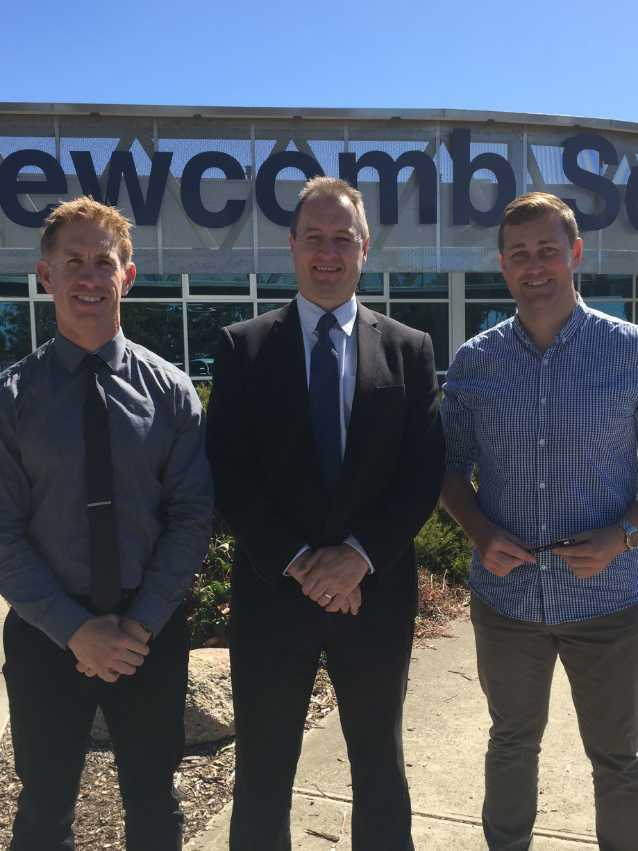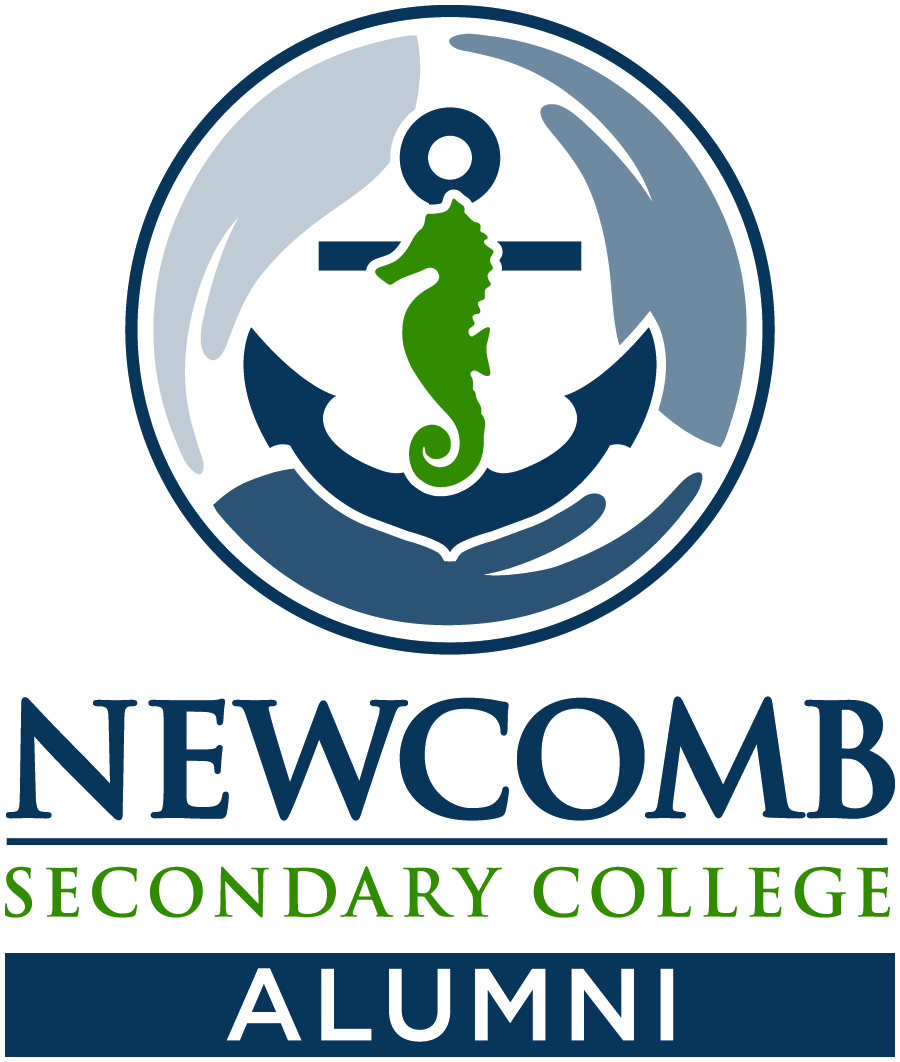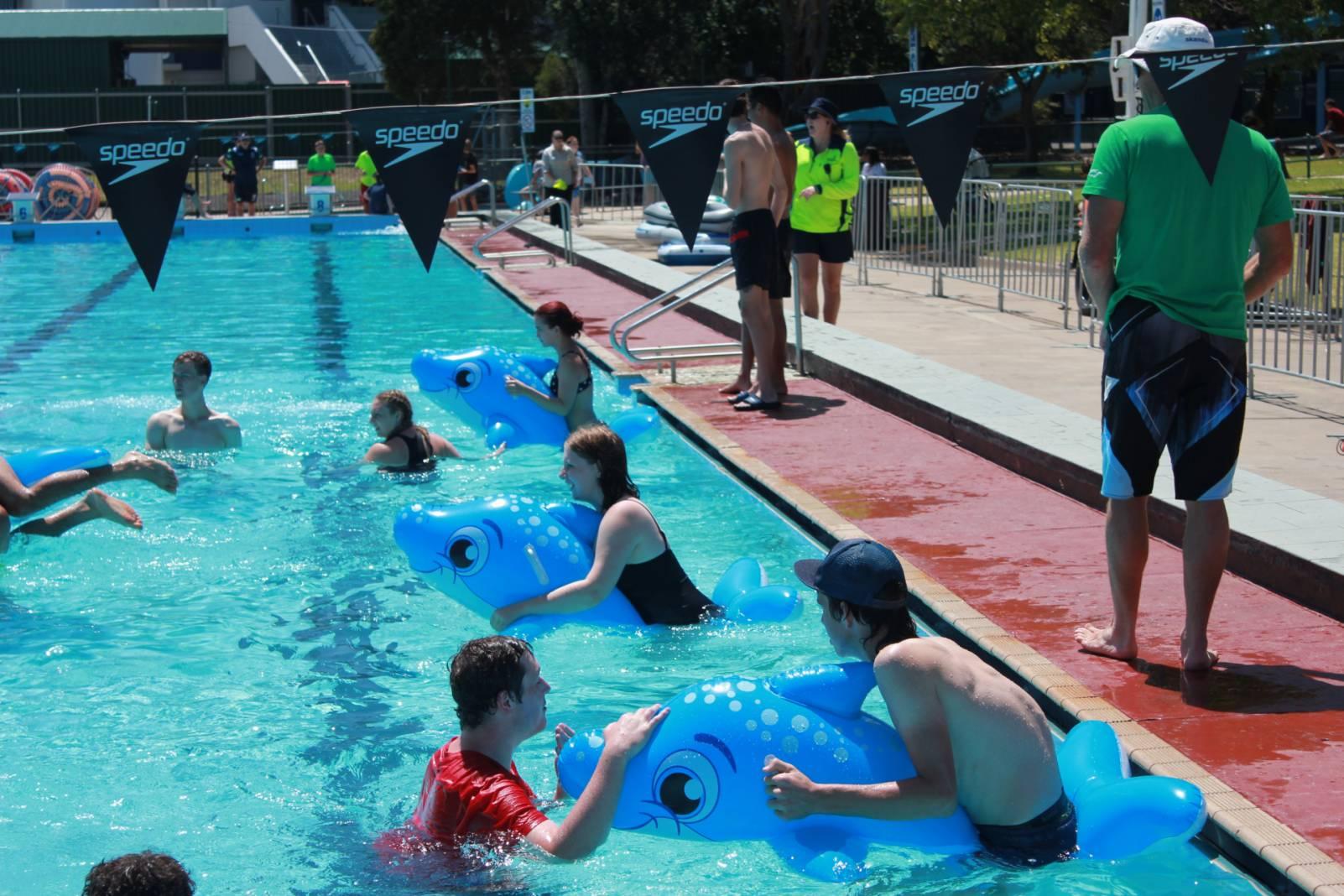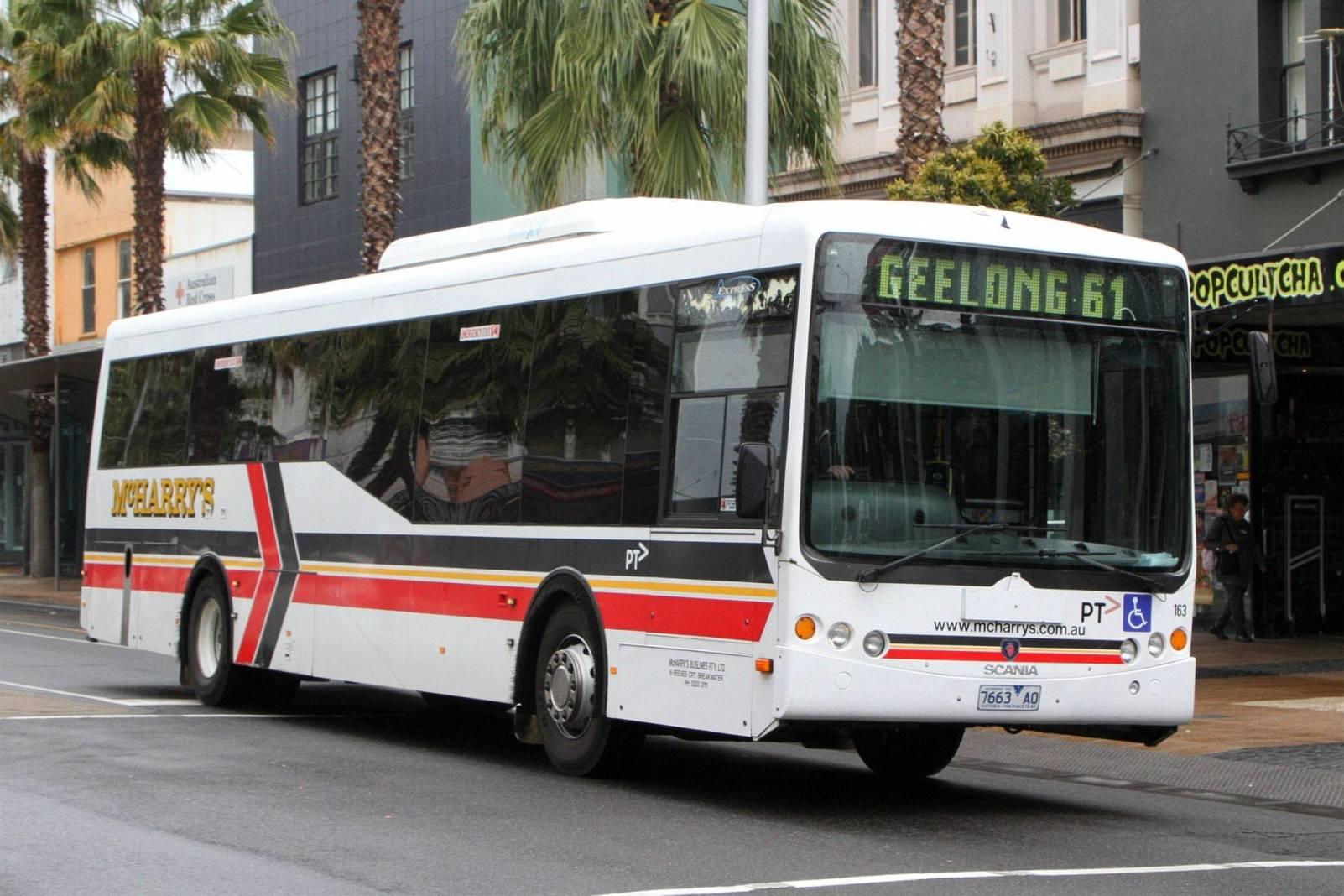From the Principal Team
COVID 19 – latest lockdown
We have no further information regarding the current lockdown. We will update families and students via Compass if there are any further updates. See below for the information distributed on Sunday evening:
Following on from recent communications, as we transition into online learning to prevent the spread of COVID-19, please be reassured that you are not expected to be teaching your young person in isolation during this short lockdown – that will remain the priority of our classroom teachers. Rather, we are just hoping that you will work with us to promote the highest possible engagement with our online learning programs, and to support the creation of healthy educational routines and habits for all of our learners.
Key points of advice to consider:
- Encouraging your young person to maintain a healthy sleeping pattern, in order to be awake and ready to commence their online learning at 9am.
- Trying as much as possible to follow the timetable that they would have for regular onsite learning. (It might be helpful for a copy of this to be in a highly visible space, such as on the fridge door.)
- Having a designated study/work space, including a desk or table, where some learning materials can be permanently kept. (Preferably in an open space to permit a level of supervision).
- Reminding your young person to log into Compass and check their messages every morning.
- Ensuring that your young person’s laptop is plugged in and charging at the end of every day.
- Supporting your young person to proactively contact their home group teacher, subject teachers and year level support team leaders if they have any enquiries or concerns.
- Managing your young person’s screen time regarding gaming and social media interactions.
More information on how to support your young person from home can be accessed on the Department of Education and Training website: https://www.education.vic.gov.au/parents/learning/Pages/home-learning.aspx
Applying for Onsite School Attendance
As was the case in the 2020 lockdowns, we will provide on-site supervision for students in the following categories:
- Children whose parents are considered essential workers as listed, cannot work from home and where no other supervision arrangements can be made
- Vulnerable children, including children in out-of-home care, children deemed by Child Protection and/or Family Services to be at risk of harm and children identified by the school as vulnerable (including via referral from a family violence agency, homelessness or youth justice service or mental health or other health service).
- It is important to note that students attending school will not be supervised by their regular teachers, but will be assisted to participate in the online learning process. Strict social distancing expectations will apply to all individuals onsite, for both teaching and non-teaching time (including recess and lunch breaks). Therefore, students at school will be participating in their learning, in the same way as if they were at home. Please see the Onsite Attendance Application form for more information on this.
Completed forms can be returned to our main office (8.30am – 4:30pm), or submitted electronically using our email address: newcomb.sc@education.vic.gov.au. To account for constantly changing circumstances, and to enable the school to organise its staffing by Thursday of each week, applications will need to be updated on a weekly basis. Once received, a member of our team will be in contact with you regarding your application.
Please do not hesitate to make contact with us in the event of more information about this being needed.
College Council
The February meeting of the Newcomb Secondary College Council will take place on Thursday evening. We will communicate with Councillors on whether this will take place online or in person – if the restrictions have been lifted.
College Council Elections
The process for the election of the new College Council has now commenced. Nominations for the three parent, one student and the two staff representative positions are now open and called for.
Nominations will close on Tuesday 23rd February at 4.00pm. The list of candidates, nominators and seconders will be displayed at the Newcomb Secondary College General Office by Thursday 25th February 2021.
If an election is necessary, I will distribute the appropriate documentation to parents and the ballots will close on Tuesday 9th March, 2021 at 4.00pm.
The parents whose time on Council has expired are:
• Cassie Clift (eligible for nomination)
• Maryanne Cleasby (eligible for nomination)
• Alison Woodard (eligible for nomination)
The student whose time on Council has expired is:
• Presley Johannesen (eligible for nomination)
Also Tahlia Hannah-Rogers is no longer eligible to be a member of the Newcomb Secondary College Council so this creates an extra student vacancy for 1 year which can be filled by co-opting an interested student.
Of course, nominations are able to be received from any parents and students and we would encourage parents and students to consider being part of the College Council.
The Department of Education and Training members whose time on Council has expired are:
• Scott McLeod (eligible for nomination)
• James Murphy (eligible for nomination)
The Newcomb Secondary College Council can also co-opt four people into the Community Members category of Council with the College Student Leaders traditionally filling some of these positions.
Other information concerning the College Council elections can be found in this newsletter. Nomination forms can be obtained from the General Office, or ring the office and a form can be sent home.
Therefore the February meeting of the College Council (this week) will be the last of the present Council and the Thursday 18th March meeting will be the first of the new College Council.
We would like to thank our retiring members for their contribution to Council
Mr Phil Honeywell, Principal
Mr James Murphy, Assistant Principal
Mr Scott McLeod, Assistant Principal
Winner Of The Glover Family Award
Glover Family Award
Congratulations to Year 12 student Tarni Muir, who has won the inaugural Glover Family Award.
The award, valued at $1000, was made possible thanks to a generous donation from the Glover siblings – Lynn, Barney and Gerry – who attended Newcomb High School in the 1970s. Lynn recently retired as the CEO of the VRQA, Barney is the Vice-Chancellor of Western Sydney University and Gerry was a long-serving staffer at the Electrical Trades Union.
The award was set up through our school’s Alumni Program last year to encourage and support a student to complete Year 12 and pursue an interest in STEM pathways. Students were invited to apply by telling us about their interests and plans for the future, as well as any barriers they might be facing.
We were pleased to acknowledge Tarni and present her with a certificate in front of her peers at the Kick Start Day on Thursday. Congratulations!
College Council Elections
Fact sheet 1: school council elections – information for parents
What is a school council and what does it do?
All government schools in Victoria have a school council. They are legally constituted bodies that are given powers to set the broad direction of a school, in accordance with Ministerial Order 1280 Constitution of Government School Councils, and the Education and Training Reform Act 2006. In doing this, a school council is able to directly influence the quality of education that the school provides for its students.
Who is on the school council?
For most primary school councils, there are several possible categories of membership:
• A mandated elected parent member category – more than one-third of the total members must be from this category. Department employees can be parent members at their child’s school as long as they are not engaged in work at the school.
• A mandated elected school employee member category – members of this category may make up no more than one-third of the total membership of school council. The principal of the school is automatically one of these members.
• An optional community member category – members are co-opted by a decision of the council because of their special skills, interests or experiences. Department employees are not eligible to be community members.
• A small number of school councils have nominee members. For all schools with a Year 7 and above cohort, there is an additional category of membership:
• A mandated elected student member category, two positions. Generally, the term of office for all members is two years. The term of office of half the members expires each year, creating vacancies for the annual school council elections.
Why is parent membership so important?
Parents on school councils provide important viewpoints and have valuable skills and a range of experiences and knowledge that can help inform and shape the direction of the school. Those parents who become active on a school council find their involvement satisfying and may also find that their children feel a greater sense of belonging.
Do I need special experience to be on school council?
Each member brings their own valuable life skills and knowledge to the role. However, councillors may need to develop skills and acquire knowledge in areas that are unfamiliar to them. It is important to have an interest in your child’s school and the desire to work in partnership with others to help shape the school’s future. Code of conduct for school councillors School councils in Victoria are public entities as defined by the Public Administration Act 2004. School councillors must abide by the Code of Conduct for Directors of Victorian Public Entities issued by the Victorian Public Sector Commission. The Code of Conduct is based on the Victorian public sector values and requires councillors to:
• act with honesty and integrity - be truthful, open and clear about their motives and declare any real, potential or perceived conflict of interest and duty
• act in good faith in the best interests of the school - work cooperatively with other councillors and the school community, be reasonable, and make all decisions with the best interests of students foremost in their minds
• act fairly and impartially - consider all relevant facts of an issue before making a decision, seek to have a balanced view, never give special treatment to a person or group and never act from self-interest
• use information appropriately - respect confidentiality and use information for the purpose for which it was made available
• exercise due care, diligence and skill - accept responsibility for decisions and do what is best for the school
• use the position appropriately - not use the position as a councillor to gain an advantage
• act in a financially responsible manner - observe all the above principles when making financial decisions
• comply with relevant legislation and policies - know what legislation and policies are relevant for which decisions and obey the law
• demonstrate leadership and stewardship - set a good example, encourage a culture of accountability, manage risks effectively, exercise care and responsibility to keep the school strong and sustainable.
Indemnity for school council members
School councillors are indemnified against any liability in respect of any loss or damage suffered by the council or any other person in respect of anything necessarily or reasonably done, or omitted to be done by the councillor in good faith in: a. the exercise of a power or the performance of a function of a councillor, or b. the reasonable belief that the act or omission was in the exercise of a power or the performance of a function of a council. In other words, school councillors are not legally liable for any loss or damage suffered by council or others as a result of reasonable actions taken in good faith.
How can you become involved?
The most obvious way is to participate in and vote in the school council elections, which are held in Term 1 each year. However, ballots are only held if more people nominate as candidates than there are positions vacant. In view of this, you might consider:
• standing for election as a member of the school council
• encouraging another person to stand for election.
What do you need to do to stand for election?
The principal will issue a Notice of Election and Call for nominations following the commencement of Term 1 each year. All school council elections must be completed by the end of March unless the usual timeline has been varied by the Minister for Education. If you decide to stand for election, you can arrange for someone to nominate you as a candidate or you can nominate yourself in the parent member category. Department employees whose child is enrolled in a school in which they are not engaged in work, are eligible to nominate for parent membership of the school council at that school. Once the nomination form is completed, return it to the principal within the time stated on the Notice of Election. You will receive a Nomination Form Receipt via post, email or by hand following the receipt of your completed nomination. Generally, if there are more nominations received than there are vacancies on council, a ballot will be conducted during the two weeks after the call for nominations has closed. Remember
• Consider standing for election to school council.
• Ask at the school for help if you would like to stand for election and are not sure what to do.
• Be sure to vote if the election goes to ballot.
• Contact the principal for further information.
Information for students seeking election to council
What is a school council and what does it do?
All government schools in Victoria have a school council. School councils are legal entities that are given powers to set the broad directions of a school in accordance with Ministerial Order 1280 Constitution of Government School Councils, and the Education and Training Reform Act 2006. In doing this, a school council is able to directly influence the quality of education that the school provides for its students.
What are some of the duties of a school councillor?
The school council has particular functions in setting and monitoring the school’s direction. School councils have key responsibilities.
• Finance: overseeing the development and expenditure of the school’s annual budget and ensuring proper records are kept of the school’s financial operation.
• Strategic planning: participating in the development and monitoring of the school strategic plan.
• Policy development and review: developing, reviewing and updating selected policies that reflect the school’s values and support the school’s broad direction outlined in its strategic plan.
• Community engagement: informing itself of community views and stimulating community interest in the school.
Other key functions of school councils may include:
• raising funds for school related purposes
• maintaining school grounds and facilities
• entering into contracts
• reporting annually to the school community and the Department
• creating interest in the school in the wider community
• representing and taking the views of the school community into account
• regulating and facilitating after-hours use of school premises and grounds
• operating a children’s service at the school.
Why is student membership so important?
Students have a unique perspective on learning, teaching and schools. Having student members on school council allows students to have a say in the future direction of their school and ensures student input into decision-making. Student representation on secondary school councils will assist in the development of students’ skills, including leadership skills and communication skills.
Do I need special experience to be on school council?
Each member brings their own valuable skills and knowledge to the role. However, councillors may need to develop skills and acquire knowledge in areas that are unfamiliar to them in order to perform their duties as a councillor. Student members are encouraged to acquire this knowledge by attending the Department’s free face-to-face Improving School Governance school council training to support them to undertake their role. For online training options, see: School Council - Training and Good Governance
Who is on the school council?
For all schools with a student cohort of Year 7 and above, there are several possible categories of school council membership:
• A mandated elected parent member category – more than one-third of the total members must be from this category. Parents and carers of children attending the school are eligible for membership in this category.
• A mandated elected school employee member category – members of this category may make up no more than one-third of the total membership of school council. The principal of the school is automatically a member of this category.
• A mandated elected student member category (two positions) – members of this category are enrolled at the school and in Year 7 or above.
• An optional community member category – members are co-opted by a decision of the council because of their special skills, interests or expertise. Department employees are not eligible to be a community member.
• A small number of school councils have nominee members.
How many student member positions are there on school council?
All Victorian government schools with a student cohort of Year 7 and above will have two mandated student member positions on school council.
Can I share the role with another student?
Councillors are not permitted to share their role. Councillors are elected to council and are expected to attend all meetings and serve their full term of office.
Are school captains and SRC members offered a position on council before other students?
While being the school captain, vice-captain or a member of the SRC can provide valuable leadership experience, no students can be offered a position in the student member category based on their standing within the school. School captains and SRC members are not automatic council members. Voting for student leaders at the school, such as school captains and SRC representatives, is a distinct and separate process to voting for student school council members. Any student interested in being a student member of their school council is required to run for election like other council members.
How long is the term of office?
Generally, the term of office for all council members is two years. The term of office of half the members in each category expires each year, creating vacancies for the annual school council elections. Students voted onto council will be elected to council for a two-year term of office.
What happens if there are tied votes?
It is likely that one student is elected each year, providing a rotation of membership each year. Now that the student membership category has been established, it is likely that one student will be elected each year. If a student member resigns prior to the end of their term of office, a casual vacancy is created. The casual vacancy is filled through the co-option process by school council.
What do I need to do to stand for election?
The principal will issue a Notice of Election and Call for Nominations following the start of Term 1 each year. If you decide to stand for election, you can arrange for a student in Year 7 or above at your school to nominate you as a candidate or you can nominate yourself (self-nomination) for the student category. Once the Nomination form is completed, it should be returned to the principal within the stated time. You will receive a Nomination Form Receipt following the receipt of the completed nomination.
Are there any rules on how I campaign?
Campaign literature supporting student member candidates for school council elections may only be distributed and posted in certain places and times as designated by the principal of your school. School resources may not be used to support candidates. The principal may invite candidates to prepare a brief written statement to be distributed with each ballot paper. The length of the candidate statement is specified by the principal and is usually no longer than 150 words.
Nominations for school council If one student vacancy is available and only one student nominated, then the student is duly elected. Unlike the parent or school employee member categories, if two student member positions are available and in the first call for nominations only one nomination is received, the student is not automatically declared elected. The principal will immediately post, in a prominent place in the school, a notice calling for further nominations. These nominations are to be received within three school days from the closing of the first call for nominations. If after the second call for nominations one other nomination is received, then both students are appointed to council. After the second call for nominations if the total number of nominations exceeds the number of vacancies then all nominees will go to ballot. The two students with the most votes will serve as the student members on school council.
How do I know which students are standing for election?
If the number of nominations exceeds the number of vacant positions, a ballot will be held. Student names will be listed in random order on the voting/ballot paper. The principal may invite candidates to prepare a brief written statement to be distributed with each ballot paper. The candidate statements will be placed in the same order as listed on the ballot papers.
How do I vote?
At least seven days before the date fixed for the closure of the ballot, the principal will arrange delivery of the ballot papers. A securely sealed ballot box or boxes in the case of multiple school campuses will be available for the casting of votes at the school between the hours of 8.00am and 4.00pm on every school day up to and including the day of the closure of the ballot. A voter must not vote more than once in a ballot and may either post the vote back to the school or deliver the completed ballot paper to the school. The principal or school staff will provide advice on how to return the completed ballot paper. School council meetings School councils must meet at least eight times a year and at least once per school term. The president chairs all meetings and all members of the council are expected to attend. Councillors can attend meetings in person or by videoconferencing or teleconferencing. Following the school council elections, council members will determine an appropriate time and location to hold meetings throughout the year. For example, council may agree that meetings will take place on the first Wednesday of each month in the school library. For most school councils, meetings are located at the school and are held in the evening to ensure the majority of members can attend. Meetings typically last for around 2.5 hours. You will need to discuss and arrange transport options to and from the meeting with your parent or carer. The school council does not provide transport. The principal, in consultation with the school council president, will ensure an agenda is prepared for each regular meeting and will distribute the agenda, draft minutes from the previous meeting and meeting papers such as subcommittee reports, principal’s and president’s report to school council members. These documents will be provided approximately five days before the meeting. All members, including student members are expected to read all documents and prepare in advance of each meeting. Conflict of interest If you, as a member of council, or your immediate family has a direct conflict of interest, including a pecuniary* interest in with a matter under discussion at a school council meeting, that member must declare the conflict of interest and must not be present during the discussion unless invited to do so by the person presiding at the meeting. The member will not be involved in any voting associated with the matter at hand. *For this purpose, pecuniary is defined as: relating to or consisting of money.
What if I cannot attend a council meeting?
If a member is unable to attend a meeting, an apology should be submitted to the principal prior to the meeting. A member of the school council may apply in writing to the president for extended leave of up to three consecutive meetings.
Is there training that I can attend?
School councillors can attend face-to-face training offered statewide. The training uses the Improving School Governance package and is at no cost to school council members. Training is available in the following modules for students: Governance, Strategic Planning, and Finance. Students are encouraged to attend the training offered by the Department in consultation with the principal. The principal is responsible for providing evidence of parent/ carer permission to the training providers should the student participate in training. The modules are also accessible as online training. Participants can complete the modules at their own pace, in any order and are able to return to each module as many times as necessary. To access the online training, see: School Council – Training and Good Governance
Can a school council tell a teacher what to do?
A school council cannot issue instructions to teachers regarding their professional duties, or to employees of the Department in respect of their duties at the school. That role is the responsibility of the principal. If a school council has developed a school policy on certain matters and that policy is consistent with Department policy the council can expect the school staff will implement the policy.
Further Information
For more information on the roles and responsibilities of school councillors, see: School Council – Powers and Functions Code of conduct for school councillors School councils in Victoria are public entities as defined by the Public Administration Act 2004. School councillors must abide by the Code of Conduct for Directors of Victorian Public Entities issued by the Victorian Public Sector Commission. The Code of Conduct is based on the Victorian public sector values and requires councillors to:
• act with honesty and integrity - be truthful, open and clear about their motives and declare any real, potential or perceived conflict of interest and duty
• act in good faith in the best interests of the school - work cooperatively with other councillors and the school community, be reasonable, and make all decisions with the best interests of students foremost in their minds
• act fairly and impartially - consider all relevant facts of an issue before making a decision, seek to have a balanced view, never give special treatment to a person or group and never act from self-interest
• use information appropriately - respect confidentiality and use information for the purpose for which it was made available
• exercise due care, diligence and skill - accept responsibility for decisions and do what is best for the school
• use the position appropriately - not use the position as a councillor to gain an advantage
• act in a financially responsible manner - observe all the above principles when making financial decisions
• comply with relevant legislation and policies - know what legislation and policies are relevant for which decisions and obey the law
• demonstrate leadership and stewardship - set a good example, encourage a culture of accountability, manage risks effectively, exercise care and responsibility to keep the school strong and sustainable.
Information for parents of children seeking election to school council
What is a school council and what does it do?
All government schools in Victoria have a school council. School councils are legal entities that are given powers to set the broad directions of a school in accordance with Ministerial Order 1280 Constitution of Government School Councils, and the Education and Training Reform Act 2006. In doing this, a school council is able to directly influence the quality of education that the school provides for its students.
Who is on the school council?
For all schools with a student cohort of Year 7 and above, there are several possible categories of school council membership:
• a mandated elected parent member category – more than one-third of the total members must be from this category. Parents and guardians of children attending the school are eligible for membership in this category.
• a mandated elected school employee member category – members of this category may make up no more than one-third of the total membership of school council. The principal of the school is automatically a member of this category.
• a mandated elected student member category (two positions) – members of this category are enrolled at the school and in Year 7 or above.
• an optional community member category – members are co-opted by a decision of the council because of their special skills, interests or expertise. Department employees are not eligible to be a community member.
• a small number of school councils have nominee members.
How long is the term of office?
Generally, the term of office for all members is two years. The term of office of half the members expires each year, creating vacancies for the annual school council elections.
Why is student membership so important?
Students have a unique perspective on learning, teaching and schooling. Electing student members onto school council allows all students to have a say in the future direction of their school and ensures student input into decision-making. Student representation on secondary school councils assists in the development of students’ skills, including leadership skills and communication skills.
Does my child need special experience to be on school council?
Each member brings their own valuable skills and knowledge to the role. However, councillors may need to develop skills and acquire knowledge in areas that are unfamiliar to them in order to perform their duties as a councillor. Student members are encouraged to attend the Department’s free face-to-face school council training, using the Improving School Governance modules to support them to undertake their role. Training is also available online. For more information about training and access to online modules, see: School Council – Training and Good Governance.
What does my child need to do to stand for election?
The principal will issue a Notice of Election and Call for Nominations following the start of Term 1 each year. If your child decides to stand for election, they can arrange for a student in Year 7 or above to nominate them as a candidate or they can nominate themselves for the student member category. Once the nomination form is completed, it should be returned to the principal within the time stated on the Notice of Election. A Nomination Form Receipt will be issued following the receipt of the completed nomination. If one student vacancy is available and one student nominates, then the student is duly elected. Unlike the parent or school employee member categories, if two student member positions are available and in the first call for nominations only one nomination is received, the student is not automatically declared elected. The principal will immediately post, in a prominent place in the school, a notice calling for further nominations. These nominations are to be received within three school days from the closing of the first call for nominations. If after the second call for nominations one other nomination is received, then both students are appointed to council. If there are more nominations received than there are vacancies on council, a ballot will be conducted during the two weeks after the call for nominations has closed. The principal will distribute ballot papers and will provide clear instructions to the voters and candidates. Voters may only vote once in a ballot. The two candidates with the highest number of votes will be elected to council.
School council meetings
School councils must meet at least eight times a year and at least once per school term. The president chairs all meetings and all members of the council are expected to attend. Councillors can attend meetings in person or by videoconferencing or teleconferencing. Following the school council elections, council members will determine an appropriate time and location to hold meetings throughout the year. For example, council may agree that meetings will take place on the first Wednesday of each month in the school library. For most school councils, meetings are located at the school and are held in the evening to ensure the majority of members can attend. Meetings typically last for around 2.5 hours. You will need to discuss and arrange transport options to and from the meeting with your child. The school council does not provide transport. The principal, in consultation with the school council president, will ensure an agenda is prepared for each regular meeting and will distribute the agenda, draft minutes from the previous meeting and meeting papers such as subcommittee reports, principal’s and president’s report to school council members. These documents will be distributed approximately five days before the meeting. All members, including student members are expected to read all documents and prepare in advance of each meeting. Conflict of interest If your child, as a member of council, or their immediate family has a direct conflict of interest, including a pecuniary* interest, in a matter under discussion at a school council meeting, that member must declare the conflict of interest and must not be present during the discussion unless invited to do so by the person presiding at the meeting. The member will not be involved in any voting associated with the matter at hand. *For this purpose, pecuniary is defined as: relating to or consisting of money.
Can I attend council meetings with my child?
School council meetings are normally open to the school community. Visitors or observers can be present at a council meeting with prior agreement of the principal and a decision of council. A request to attend must be forwarded either to the principal or president. There may be times when, for the purpose of confidentiality or other reasons, a council meeting needs to be closed and only the appointed members can attend.
I am a parent member of the council. Can I be a member of the same council as my child(ren)?
Yes, relatives are allowed to be members of the same council.
What if my child cannot attend a council meeting?
If a member is unable to attend a meeting, an apology should be submitted to the principal prior to the meeting. A member of the school council may apply in writing to the president for extended leave of up to three consecutive meetings.
What if my child decides they no longer want to be a member of council?
The Department strongly encourages students to consider the time commitment of being on council prior to running for election. Your child should discuss resigning from council with the principal or school council president. A school councillor is required to formally submit their resignation from council in writing to the principal, in order to no longer be considered a member.
Code of conduct for school councillors
School councils in Victoria are public entities as defined by the Public Administration Act 2004. School councillors must abide by the Code of Conduct issued by the Victorian Public Sector Commission. The Code of Conduct is based on the Victorian public sector values and requires councillors to:
• act with honesty and integrity - be truthful, open and clear about their motives and declare any real, potential or perceived conflict of interest and duty
• act in good faith in the best interests of the school - work cooperatively with other councillors and the school community, be reasonable, and make all decisions with the best interests of students foremost in their minds
• act fairly and impartially - consider all relevant facts of an issue before making a decision, seek to have a balanced view, never give special treatment to a person or group and never act from self-interest
• use information appropriately - respect confidentiality and use information for the purpose for which it was made available
• use the position appropriately - not use the position as a councillor to gain an advantage
• act in a financially responsible manner - observe all the above principles when making financial decisions
• exercise due care, diligence and skill - accept responsibility for decisions and do what is best for the school
• comply with relevant legislation and policies - know what legislation and policies are relevant for which decisions and obey the law
• demonstrate leadership and stewardship - set a good example, encourage a culture of accountability, manage risks effectively, exercise care and responsibility to keep the school strong and sustainable.
Indemnity for school council members
School councillors are indemnified against any liability in respect of any loss or damage suffered by the council or any other person in respect of anything necessarily or reasonably done, or omitted to be done by the councillor in good faith in: a. the exercise of a power or the performance of a function of a councillor, or b. the reasonable belief that the act or omission was in the exercise of a power or the performance of a function of a council. In other words, school councillors are not legally liable for any loss or damage suffered by council or others as a result of reasonable actions taken in good faith.
For further information please contact the school principal.
Tutoring
By Peter Drummond
Small Group Tutoring Initiative
The Small Group Tutoring Initiative is being funded by the Department of Education and Training for 2021 to support students following the disruption during 2020 due to Covid-19. Small groups of students at Newcomb SC will receive tutoring both inside their normal classroom (that is, where an extra teacher/tutor is present in the classroom working with a small group) or in some cases small groups are withdrawn for one or two periods per week to receive tutoring. Most of the tutoring will occur in English and Math's classes.
The tutoring program is open to students across all year levels (Years 7-12). Up to 20% of our students at the College can receive tutoring.
The school is in the final stages of recruiting tutors for the program. We have done this in a variety of ways. For example, some part-time staff have had their hours extended with others being recruited from outside the school or have time re-allocated to tutoring. We are also in the process of identifying students who will be part of the program.
Tutors will begin working with some students from the beginning of Week 4 (Monday, 15th February). Whilst most tutoring will occur in the first half of the year it is anticipated that some tutoring will continue until the end of the year. Tutors will develop Learning Plans for each student. They will work collaboratively with the current teachers to determine the gaps in learning.
The funding for the tutoring program is for 2021 only. However, the College will evaluate the program towards the end of the year and make decisions about whether to continue parts of the program into 2022.
If you have any questions, please contact Mr. McLeod or Mr. Drummond at the College.
Year 12 Kickstart
By Jennifer Chiu, Ourschool Alumni Program Coordinator
Alum helps ‘Kick Start’ Year 12
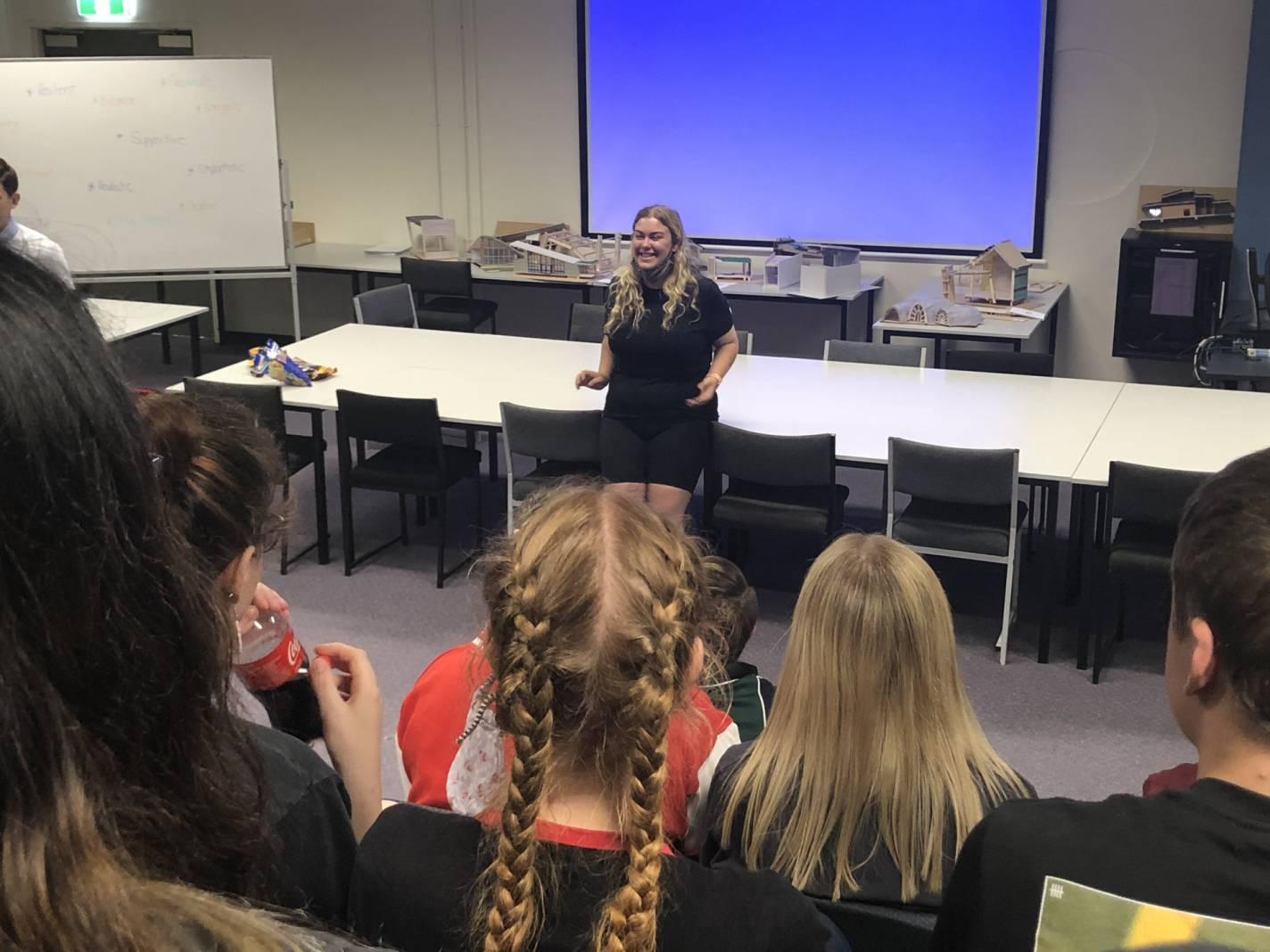
Bianca is one of our newest members of the Newcomb Alumni Program, signing up to speak with future generations of Newcomb students. Having just completed Year 12, Bianca is a relatable role model who has the experiences and strategies of last year fresh in her mind.
Bianca fielded students’ questions on topics like dealing with stress, preparing for exams, and transitioning to uni.
One of her best pieces of advice was for students not to be afraid of seeking feedback from teachers - communicate with them and ask how you can improve. Her tips for getting ready for exams were to prepare early and know what study style works best for you.
Bianca's proactive approach to Year 12 has paid off. She's already started tertiary studies in Beauty this year and is set to study Photography next year.
To end the session, our alumni program coordinator Jennifer Chiu presented Bianca with a Newcomb Secondary College keep cup to thank her for spending her uni lunch break to help set our Year 12s up for their final year of school.
We look forward to organising more alumni talks as the year progresses.
Swimming Sports
By Mr Peter Currie
SWIMMING SPORTS – Wednesday 17th February - CANCELLED
Unfortunately we are unable to proceed with the swimming sports on Wednesday this week as planned because of the “flash” lockdown.
We have tried to acquire an alternative date but unfortunately Kardinia Aquatic Centre is fully booked.
We still plan on sending a team to the interschool championships on Friday 26th February, but we will have to be creative in how we select the team. Soon I’ll be calling for nominations and it will be chosen on students times from previous results. If your young person is a member of a club, trains with a squad or is a strong swimmer, keep an eye on the Compass Feeds and emails for further information.
College Photos
By Scott McLeod
School Photos
Last Friday, February 12, Arthur Reed Photography attended the college to take the photos of all staff and students. It is fair to say that the Newcomb Secondary College staff and students are certainly a good looking bunch of people!
The morning photo schedule ran smoothly and we were able to capture a photo of all those in attendance on the day. For those staff and students who were absent on Friday, we do have a ‘catch-up day’ with Arthur Reed on Thursday March 4th at Newcomb SC in the Language Centre.
School Photos 2021 – Newcomb Secondary College
Annual school photos have been taken by Arthur Reed Photos.

To view the images of your child and order photos, you will need to register online.
- Go to https://order.arphotos.com.au
- Enter the 2021 image code for your child (from their personalized flyer)
- Fill in your email and mobile details
That’s it! When 2021 photos are ready, you will be notified by email and SMS.
Even if you registered last year, it’s important that you register this year using your child’s new 2021 image code to link their images for the current year with your contact details.
Once registered, please wait for notification that 2021 images are online to view before making your purchase.
In the webshop you can view photos and customize your photo package; Choose ANY layout, ANY image and purchase multiple digital image downloads.
Order within 10 days of notifications to take advantage of the discounted pricing period and ‘free back to school’ delivery or opt to have your photo order sent directly to your nominated address (postage fees may apply).
Register Online now to be notified when 2021 school photos can be viewed and ordered.
Conveyance
By Alisha Greenwood
Conveyance Allowance Program
Applications for Term 1 close Friday 12th March 2021
The conveyance allowance is a form of financial assistance to help families in rural and regional Victoria with the cost of transporting their children to their nearest appropriate school/campus.
To be eligible to claim the Conveyance Allowance, students must:
- attend their nearest government or non-government school/campus appropriate to their year level at which admission is permissible
- be enrolled at a school/campus outside Melbourne’s metropolitan conveyance boundary
- reside 4.8km or more by the shortest practicable route from that school/campus attended
- be of school age (5 to 18 years old at time of application) and reside in Victoria.
Application Process
Step 1 Complete PTV School Student ID and Student Pass Application Form
(including student photographs)
Step 2 Bring completed PTV form to the General Office so that it can be stamped
and signed
Step 3 Take PTV form to nearest manned train station to have card made. Whilst at
the station, purchase either a half-yearly or yearly Myki pass and obtain a
receipt
Step 4 Complete Form 3: Conveyance Allowance application - Public transport travel
and return to the General Office with Myki receipt
Step 5 Reimbursement will be made to families in June and December
Any queries regarding this can be made through Mrs. Greenwood at the office 5248 1400.
Lawyers in Schools Program
By Alison Lever
Community Page

Introducing Deadly & Proud, a Victorian Government campaign sharing stories from Aboriginal Victorians and Traditional Owners which instil pride in Victoria’s Aboriginal cultures, resilience, communities, and our path to treaty and truth and justice. Find out more by visiting the website, https://deadlyandproud.vic.gov.au/ #DeadlyandProud
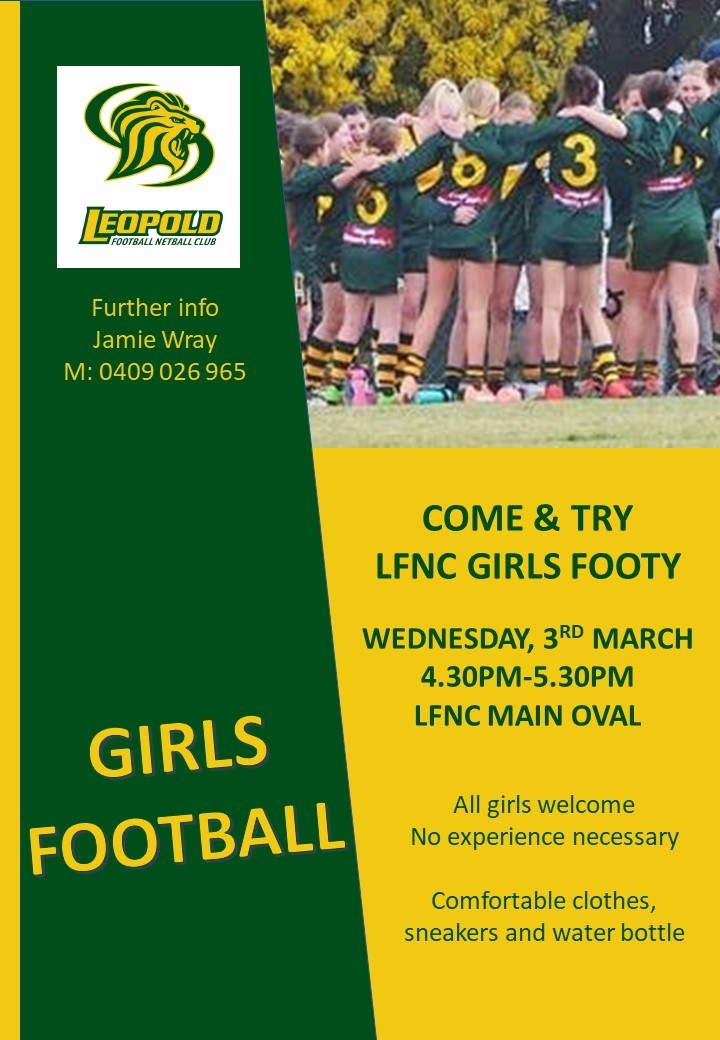
Programs provided by
Regional Parenting Service
POSITIVE PARENTING PROGRAM
Dates: Monday 1 March – 22 March
Time: 7.00pm - 9.00pm
‘Ariston’ 245-249 Pakington St, Newtown
Positive Parenting Program is a 3-week program for parents of children aged 2 – 8 years.
There is no right way to be a parent, but the PPP program offers:
- Information and support;
- Practical answers to everyday parenting concerns;
- Group will run for 3 weeks, followed up by 2 weekly telephone sessions.
TUNING IN TO KIDS
Dates: Thursday 11 February – 18 March
Time: 7.00pm - 9.00pm
‘Ariston’ 245-249 Pakington St, Newtown
Tuning in to Kids is a 6-week supportive program for parents of children aged 4 to 10 yrs.
The program aims to:
- Help parents teach and support their child/ren to understand and manage their emotions;
- Support parents in encouraging children to express emotions appropriately;
- Maximise children’s social, behavioural and learning outcomes.
THE DAD WORKSHOP
Dates: Tuesday 9 February – 16 March
Time: 7.30pm - 9.00pm (Online via Zoom)
This 6-week program will focus on giving you the tools you need to create a better life for your entire family.
We will look at simple things you can do to improve:
- Your relationship with yourself;
- Your relationship with your partner;
- Your relationship with your kids.
FLOURISHING FAMILIES
Dates: Tuesday 23 February – 30 March
Time: 7.30pm - 9.00pm (Online via Zoom)
A 6-week program for parents of children of all ages to discover how wellbeing can help you and your family to flourish. Learn about current research and practical skills that will help your family:
- Promote resilience;
- Increase awareness of character strengths;
- Nurture and sustain positivity;
- Give effective feedback and support individual growth;
- Explore family values.
PARENTING YOUR TEENAGER
Dates: Thursday 11 February – 18 March
Time: 7.30pm - 9.00pm (Online via Zoom)
Parenting Your Teenager is a 6-week supportive program for parents of teens aged 12 to 18 years.
The program aims to:
- Support parents to connect and communicate with their teens;
- Assist parents with understanding adolescent development;
- Help parents to assist their teen to develop emotional intelligence;
- Remain empathetic and stay connected.
BRINGING UP GREAT KIDS
Dates: Thursday 18 February – 25 March
Time: 7.30pm - 9.00pm (Online via Zoom)
Bringing up Great Kids is a 6-week supportive program for parents of children aged 12 months to 9 yrs.
The program aims to:
- Develop parents’ skills to enhance communication with their children;
- Promote positive interactions between parents and their child/ren;
- Encourage the development of a child’s positive self-identity.
The First 1000 Days
Dates: Wednesday 17 February – 24 March
Time: 7.00pm – 8.30pm (Online via Zoom)
The first 1,000 days of life is a program for parents with children aged under 12months and designed to nurture parents as they embark on their journey. It provides parents with a knowledge about brain development and an understanding of how children grow and what they need. The centrality of family relationships and opportunities for parents to reflect on their own childhood and how to connect with their children are all explored.
NO SCAREDY CATS
Dates: Wednesday 17 March – 31 March
Time: 7.30pm - 9.00pm (Online via Zoom)
A 3-week program for parents of children 2 – 12 years to gain an understanding of the increasing levels of anxiety in their child and strategies to help manage the “traps and tripwires” with strengthening sayings, questioning strategies and mindful exercises.
Programs provided by
Barwon Child Youth & Family (BCYF)
Contact BCYF regarding program delivery
Ph: 5226 8900 or www.bcyf.org.au
TUNING IN TO KIDS
Date: Wednesday 17 February – 24 March
Time: 10.30am – 12.30pm (Online via Zoom)
Tuning in to Kids is a 6-week supportive program for parents of children aged 3 years – 12 years.
The program aims to:
- Help parents teach their children to understand and manage their emotions;
- Support parents in encouraging children to express emotions appropriately;
- Maximise children’s social, behavioural and learning outcomes.
DADS TUNING IN TO KIDS
Date: Wednesday 17 February – 24 March
Time: 10.00am – 12.00pm (Online via Zoom)
Dads Tuning in to Kids is a 6-week supportive program specifically for Dads of children aged 3 years – 12 years.
The program aims to:
- Help dads to effectively tune in to their child’s emotions;
- Encourage dads to strengthen their emotional connection with their child;
- Support dads to build skills in emotion coaching to assist their child’s individual needs.
BUMPS TO BUBS
Date: Wednesday 10 February – 31 March
Time: 1.30pm – 3.00pm
Northern Bay Family Learning Centre, Goldsworthy Rd, Corio
Bumps to Bubs is a 10-week program and brings young mothers and mothers-to-be (up to 23 years) with babies 0-1 year, together to support the journey of parenting.
BUMPS TO TOTS
Date: Tuesday 9 February – 30 March
Time: 1.30pm – 3.00pm
Northern Bay Family Learning Centre, Goldsworthy Rd, Corio
This Program brings parents together to provide support and education to enhance a child’s development in the 1-2 year age group. The program will assist parents with ideas to manage the toddler years and enjoy this stage of early development.
BRINGING UP GREAT KIDS
Date: Tuesday 16 February – 23 March
Time: 10.30am – 12.30pm
Norlane Child & Family Centre, 52-56 Gerbera Ave, Norlane
Bringing Up Great Kids is a 6-week supportive program for parents of children aged 12 months – 12 years.
The program aims to:
- Develop parents’ skills to enhance communication with their children;
- Promote positive interactions between parents and their children;
- Encourage the development of children’s positive self-identity.
TUNING IN TO TEENS
Dates: Tuesday 16 February – 23 March
Time: 10.30am – 12.30pm (Online via Zoom)
Dates: Wednesday 17 February – 24 March
Time: 12.30pm – 2.30pm
BCYF Headspace, 105 Yarra St, Geelong
Tuning in to Teens is a 6-week supportive program for parents of adolescents aged 10 years to 18 years.
The program aims to:
- Support parents to connect and communicate with their teen;
- Assist parents with understanding adolescent development;
- Help parents to assist their teen to develop emotional intelligence.
Programs provided by
Drummond St Services
Drummond St are running all webinars, seminars and groups online – please check under https://ds.org.au/events/ - free and accessible online, including children’s music groups. Seminars on parenting toddlers, teens, managing anxiety and many more.
Programs provided by
Regional Parenting Service
POSITIVE PARENTING PROGRAM
Dates: Monday 1 March – 22 March
Time: 7.00pm - 9.00pm
‘Ariston’ 245-249 Pakington St, Newtown
Positive Parenting Program is a 3-week program for parents of children aged 2 – 8 years.
There is no right way to be a parent, but the PPP program offers:
- Information and support;
- Practical answers to everyday parenting concerns;
- Group will run for 3 weeks, followed up by 2 weekly telephone sessions.



